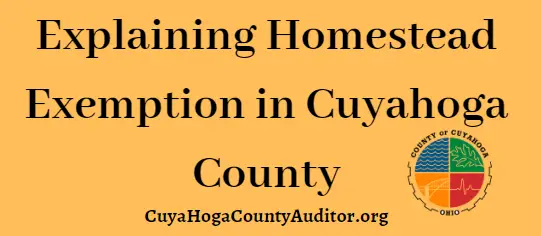Homestead Exemption is a valuable program aimed at providing homeowners with relief from property taxes. It is designed to reduce the property tax burden for eligible homeowners, thereby making homeownership more affordable. In this article, we’ll delve into the specifics of Homestead Exemption, particularly focusing on its application and benefits in Cuyahoga County.
Understanding Homestead Exemption
Homestead Exemption is a legal provision that allows homeowners to exempt a portion of their property’s value from taxation. This exemption applies to a primary residence, often referred to as a homestead. By reducing the taxable value of the property, homeowners can lower their annual property tax bills.
Eligibility Criteria
To qualify for Homestead Exemption, homeowners must meet certain criteria, which may vary depending on the jurisdiction. Generally, the following conditions apply:
Residency Requirements
Homeowners must occupy the property as their primary residence. This means the property must serve as the owner’s permanent place of residence.
Ownership Requirements
Applicants must be the legal owners of the property and hold the title to the homestead. In some cases, joint ownership may also be acceptable.
Additional Criteria
Some jurisdictions impose additional requirements, such as income limits or age restrictions. However, these criteria may not apply universally.
Benefits of Homestead Exemption
The benefits of Homestead Exemption extend beyond property tax relief. Here are some advantages:
Property Tax Reduction
The primary benefit of Homestead Exemption is the reduction of property taxes. By exempting a portion of the property’s assessed value, homeowners can enjoy significant savings on their tax bills.
Protection from Creditors
In some states, Homestead Exemption offers protection from creditors. This means that creditors cannot force the sale of the homestead to satisfy debts, providing homeowners with a safeguard against financial hardship.
Transferability
In many cases, Homestead Exemption benefits can be transferred to surviving spouses or dependents in the event of the homeowner’s death. This ensures that the protection and tax savings provided by the exemption continue for the family.
Applying for Homestead Exemption
Applying for Homestead Exemption typically involves completing an application form and submitting it to the relevant tax authority. In Cuyahoga County, homeowners can apply for the exemption through the county auditor’s office.
Application Process
The application process may vary, but it generally requires providing basic information about the property and the homeowners. This may include proof of residency, proof of ownership, and other supporting documents.
Required Documents
Homeowners applying for Homestead Exemption in Cuyahoga County may need to provide documents such as a copy of their deed, proof of residency (such as a utility bill), and identification.
Deadlines
It’s important to adhere to deadlines when applying for Homestead Exemption. Missing the deadline could result in the loss of potential tax savings for the current year.
Homestead Exemption in Cuyahoga County
In Cuyahoga County, Homestead Exemption offers eligible homeowners a reduction in their property tax bills. The program is administered by the county auditor’s office, which determines eligibility and processes applications.
To qualify for Homestead Exemption in Cuyahoga County, homeowners must meet certain criteria, including residency and ownership requirements. Once approved, the exemption remains in place as long as the homeowner continues to meet the eligibility criteria.
Common Misconceptions about Homestead Exemption
Despite its benefits, Homestead Exemption is sometimes misunderstood. Here are a few common misconceptions:
Misunderstandings about Eligibility
Some homeowners may mistakenly believe they are not eligible for Homestead Exemption due to factors such as income level or property value. However, eligibility criteria vary by jurisdiction, and many homeowners may qualify without realizing it.
Effect on Property Value
There is a misconception that Homestead Exemption can negatively impact property values. In reality, the exemption often makes homeownership more affordable, which can have a positive effect on property values by increasing demand.
Frequently Asked Questions about Homestead Exemption
How does Homestead Exemption affect property taxes?
Homestead Exemption reduces the taxable value of a property, resulting in lower property tax bills for eligible homeowners.
Can I apply for Homestead Exemption if I own multiple properties?
Homestead Exemption typically applies only to a homeowner’s primary residence. Owning multiple properties may affect eligibility.
Is Homestead Exemption the same across all counties?
No, Homestead Exemption programs vary by jurisdiction. Eligibility criteria and benefits may differ from one county to another.
Can I apply for Homestead Exemption if I am renting a property?
No, Homestead Exemption is only available to homeowners who occupy their property as their primary residence.
What happens if I sell my home after receiving Homestead Exemption?
If you sell your home, you must notify the tax authority and may be required to repay any tax savings received through Homestead Exemption.
